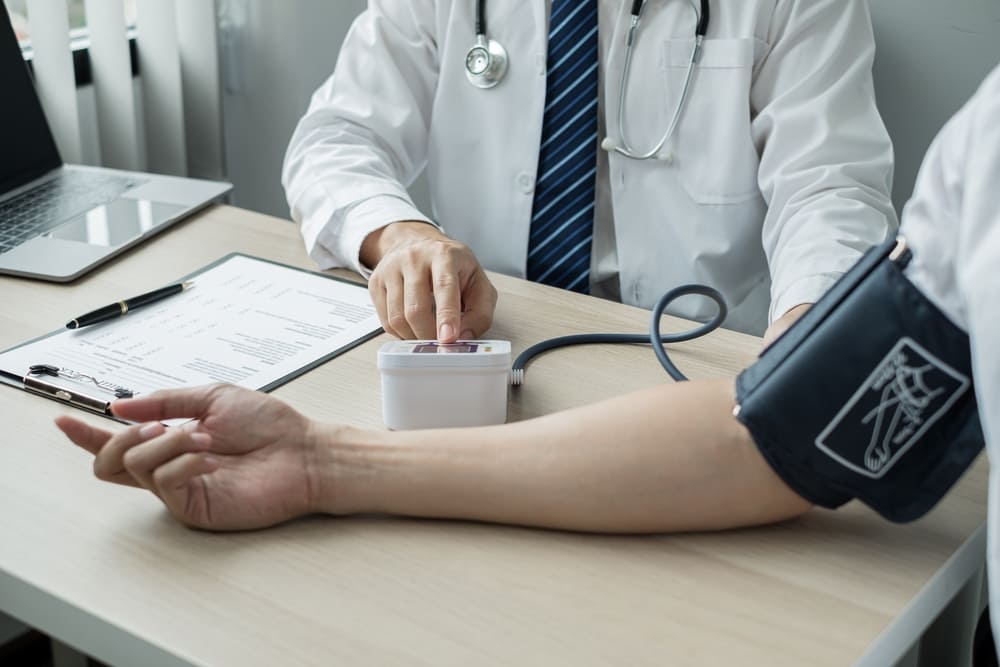CHECK-UP / GENERAL MEDICAL / PREVENTION
Health is the most important thing in life!
Who should have a check-up?
All people over the age of 35.
If this examination did not show any findings that need to be checked, the next check can be done around the age of 40.
Depending on the result and state of health, further preventive examinations should then be carried out annually or after a longer interval.
According to current WHO guidelines, men should be the first at 50, women at 55 to get a colonoscopy for colorectal cancer screening, and then get this exam every 7-10 years (colon cancer is the second and third most common malignant tumor).
For further preventive examinations (gynecological, urological, dermatological etc.) please ask your specialist doctor.
The costs of medical check-ups are generally reimbursed by your health insurance company. Please check with your insurance company!

Why does medical prevention make sense?
Everything in our life depends on our health! Nowadays, a healthy lifestyle, prevention and timely diagnosis of diseases that require treatment play an increasingly important role and awareness of preventive healthcare is growing. The medical health check is therefore becoming more and more important due to the demographic change and the increase of the number of diseases (e. g. high blood pressure, diabetes mellitus, obesity). If a medical check-up is carried out by a specialist with the appropriate experience and advisory skills, you can prevent many diseases!
The earlier risks are detected, the sooner they can be counteracted with various treatments and often the outbreak of a disease can be entirely avoided. For instance, by performing an examination of your arteries, calcifications and vascular obstructions as an indication of an increased risk of heart attack and stroke can be detected or excluded. This test is particularly recommended for smokers, diabetics and people with high blood pressure and high cholesterol levels.
Regular colonoscopies with sedation every seven to ten years can prevent up to 90 percent of all fatal colon cancers. If there is an increased risk of esophageal or gastric tumors, a gastroscopy with sedation may be performed, too.
Our check-up includes reasonably graded examinations with the most modern examination procedures. We would be happy to put together your personal examination program based on your personal risk. Of course, further individually adapted examinations can be carried out at any time, if necessary.
Check-up examinations include:

Our check-up includes reasonably graded examinations with the most modern examination procedures. We would be happy to put together your personal examination program based on your personal risk. Of course, further individually adapted examinations can be carried out at any time, if necessary.
Check-up examinations include:
Finally:
Detailed final discussion and consultation with recommendations on prevention, other necessary examinations, treatment and follow-ups. Detailed written report containing all results.
Further examinations such as computed tomographies, magnetic resonance imaging, scintigraphies, angiograms, etc. can be organized for you promptly in our partner hospital Clínica Rotger in Palma de Mallorca.
Detailed preliminary interview, evaluation of the questionnaire on your medical history
Physical examination
Blood work
Blood work: complete blood count, liver, bile and kidney values, blood fats, blood sugar, thyroid and inflammation values. Depending on age and request, other values such as tumor markers, hormones, vitamin status, urine test, stool examination
Electrocardiogram (ECG) at rest
Cardiac stress test (ergometry):
study your state of fitness, risk of heart attacks
Transcutaneous oxygen measurement of the blood (pulse oximetry):
to rule out an oxygen deficiency
Color-coded digital ultrasound examination of the heart (echocardiography):
evaluation of the size, function, valves and pericardium of the heart
Digital color ultrasound examination of the carotid arteries:
evaluation of your stroke risk, to rule out arterosclerosis
Ultrasound examination of the thyroid gland:
to rule out nodules, inflammation, cancer
Ultrasound examination of the abdominal organs:
liver, pancreas, spleen, gall bladder, bile ducts, kidneys, abdominal aorta, bladder
If necessary:
Colonoscopy with sedation
and possible removal of intestinal polyps, colon cancer prevention, tissue sample examinations (for histological examination)
Gastroscopy with sedation
tissue samples for histological examination to rule out an inflammation, infection with Helicobacter pylori, gluten intolerance, cancer of the esophagus, stomach or duodenum
Digital color ultrasound examination of the leg arteries
e.g. in case of limited walking distance in smokers or diabetics
Long-term electrocardiogram (ECG) monitoring / long-term blood pressure measurement
in case of arrhythmia, hypertension and vertigo
Lung function test:
in case of shortness of breath, cough, asthma or COPD
X-ray of the chest organs or abdomen:
to rule out an infection, liquid retention or cancer
Finally:
Detailed final discussion and consultation with recommendations on prevention, other necessary examinations, treatment and follow-ups. Detailed written report containing all results.
Further examinations such as computed tomographies, magnetic resonance imaging, scintigraphies, angiograms, etc. can be organized for you promptly in our partner hospital Clínica Rotger in Palma de Mallorca.
